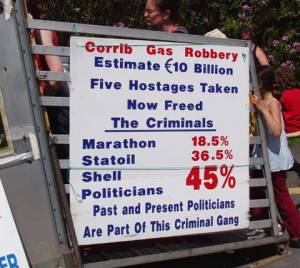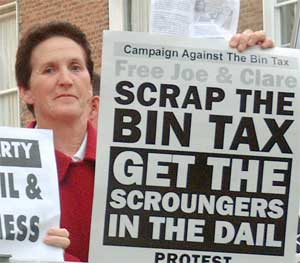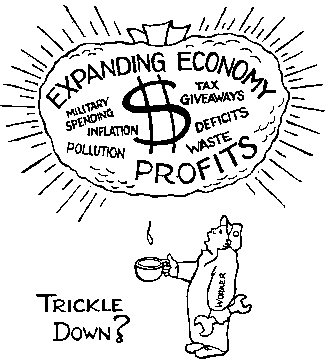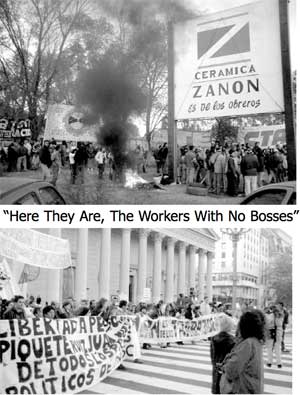Over 30 years of anarchist writing from Ireland listed under hundreds of topics
Magazine
Privatisation – the rip-off of public resources
 Throughout the world, public services have been under attack for the past twenty years. Forming a central plank of the capitalist globalisation agenda, ‘privatisation’ and ‘competition’ are the seemingly unchallenged dogma of modern capitalism. The levels of privatisation which have taken place worldwide are absolutely mindblowing. During the 1990s alone over $900 billion worth of public assets were transferred into private hands. Globally this agenda is pushed by the World Bank and the World Trade Organisation (WTO). The basic theory by which these bodies operate is that all decisions should be made on the basis of profitability alone.
Throughout the world, public services have been under attack for the past twenty years. Forming a central plank of the capitalist globalisation agenda, ‘privatisation’ and ‘competition’ are the seemingly unchallenged dogma of modern capitalism. The levels of privatisation which have taken place worldwide are absolutely mindblowing. During the 1990s alone over $900 billion worth of public assets were transferred into private hands. Globally this agenda is pushed by the World Bank and the World Trade Organisation (WTO). The basic theory by which these bodies operate is that all decisions should be made on the basis of profitability alone.
Men are from Earth, and So are Women
 How different are men and women? Very, according to some. John Gray’s book “Men are from Mars, Women are from Venus” is based on the idea that there are fundamental differences between the genders. It may be just another self-help book on relationships, but it has also sold over 30 million copies and been translated into 40 languages. Deborah Tannen’s book “You Just Don’t Understand: Men and Women in Conversation” was on the New York Times bestseller list for nearly four years and has been translated into 24 languages.
How different are men and women? Very, according to some. John Gray’s book “Men are from Mars, Women are from Venus” is based on the idea that there are fundamental differences between the genders. It may be just another self-help book on relationships, but it has also sold over 30 million copies and been translated into 40 languages. Deborah Tannen’s book “You Just Don’t Understand: Men and Women in Conversation” was on the New York Times bestseller list for nearly four years and has been translated into 24 languages.
Anarchism, insurrections and insurrectionalism
 Insurrections - the armed rising of the people - has always been close to the heart of anarchism. The first programmatic documents of the anarchist movement were created by Bakunin and a group of European left-republican insurrectionists as they made the transition to anarchism in Italy in the 1860's. This was not a break with insurrectionism but with left-republicanism, shortly afterwards Bakunin was to take part in an insurrection in Lyon in 1870.m[Castellano]
Insurrections - the armed rising of the people - has always been close to the heart of anarchism. The first programmatic documents of the anarchist movement were created by Bakunin and a group of European left-republican insurrectionists as they made the transition to anarchism in Italy in the 1860's. This was not a break with insurrectionism but with left-republicanism, shortly afterwards Bakunin was to take part in an insurrection in Lyon in 1870.m[Castellano]
Environmentalism, Class and Community
 The economic boom in Ireland and the construction boom that has come alongside it has led to a growth in the importance of environmental campaigns. There has frequently been a large gap between the environmentalists involved in such campaigns and the left - including anarchists. Sean, one of the 'Carrickminders' and now a member of the WSM gives his view on what can be learnt from the recent struggles. Capitalism in Ireland is certainly booming. The country in profit based terms has seen unprecedented growth. This growth is illustrated on the great barometer of Capitalism- GDP (Gross domestic product) which has increased each year since 1991.
The economic boom in Ireland and the construction boom that has come alongside it has led to a growth in the importance of environmental campaigns. There has frequently been a large gap between the environmentalists involved in such campaigns and the left - including anarchists. Sean, one of the 'Carrickminders' and now a member of the WSM gives his view on what can be learnt from the recent struggles. Capitalism in Ireland is certainly booming. The country in profit based terms has seen unprecedented growth. This growth is illustrated on the great barometer of Capitalism- GDP (Gross domestic product) which has increased each year since 1991.
Looking back on the battle of the Bins & the Lessons Learnt - Interview
 The campaign against the bin charges was one of the largest organised mass movements of resistance to the state in recent years. Local organising groups popped up across the city. It climaxed in the winter of 2003, with the jailings of numerous activists in quick succession. Here we talk to Dermot Sreenan, a member of the WSM who has been a prominent activist in the campaign from the off.
The campaign against the bin charges was one of the largest organised mass movements of resistance to the state in recent years. Local organising groups popped up across the city. It climaxed in the winter of 2003, with the jailings of numerous activists in quick succession. Here we talk to Dermot Sreenan, a member of the WSM who has been a prominent activist in the campaign from the off.
Communism: What's In A Word?
This article opens by looking at how the meaning of communism as opposed to socialism evolved in the late nineteenth century and closes with a look at how this applies to the free software movement today. The terms socialism and communism appear in England around the 1820s as terms adopted by members of the cooperative movement who were sick of hearing their politics referred to as "Owenism". Originally the two terms were undifferentiated but by the 1840s communism was used by revolutionaries to differentiate themselves from reformists such as J.S.Mill who had adopted socialism to cover an indigestible mess of reformisms.
The Dublin EU Mayday protests of 2004 - The Ghost of Mayday Past

Compared to many other European countries May Day demonstrations have always been small in Ireland, even in the 1980's when the Stalinist left was much more influential and the unions were much more powerful. By the mid-1990's, with the old left in complete disarray and the union bureaucrats more focussed on partnership with the state and the bosses rather than workers' rights, May Day had become a fairly underwhelming event.
So, given this dismal tradition why were the explicitly libertarian May Day events in 2004, comparatively speaking, such a success? Of course there was the impetus of a major European Union summit but to understand why anarchists were in a position to organise big May Day events calls for a brief examination of the development of libertarian ideas and practices in Ireland over the past few years.
The Nomad, the Displaced and the Settler: Work in the 21st century
 In many countries there has been a debate as to the nature of the changes in western workplaces; in Britain they talk about increased casualisation of the workforce, in the US they talk about contingent labour and on the European continent they use the language of precarity. Central to in all these debates is the issue of job insecurity.
In many countries there has been a debate as to the nature of the changes in western workplaces; in Britain they talk about increased casualisation of the workforce, in the US they talk about contingent labour and on the European continent they use the language of precarity. Central to in all these debates is the issue of job insecurity.
A number of issues are being discussed. Firstly has the workplace changed fundamentally such that people increasingly are in temporary work rather than permanent work? Secondly is the division between work time and non-work time dissolving, are we spending more of our lives 'in work'? Thirdly are the non-work aspects of life becoming increasingly insecure?
No Global - The People of Ireland Versus the multinationals
Essentially it is an account of the various environmental clashes that have taken place in Ireland since the mid-70s when the Irish Government's policy of attracting multinational corporation into Ireland - in particular in the chemicals and pharmaceuticals sector - moved into full swing. In terms of being a record of these many struggles, No Global is a very useful compendium with a lot of first hand information as well as useful analysis. The author was involved in some of the events he addresses and this adds a particular validity to the account.
Workers Without Bosses - Workers' Self-Management in Argentina
 The last 30 years in Latin America have seen the introduction of neo-liberal policies - structural adjustment programmes, austerity measures, a shift from the industrialisation and "internal accumulation" model to one that favours promiscuous financial capital, free trade agreements and an increasing economic dependency of the region on the USA. As usual, the people have suffered the worst part of these policies - high levels of unemployment and depression of wages and the standard of living. People's most immediate and basic needs were expendable when it came to the real priorities of local governments: the payment of the fraudulent external debt & the maintenance of high levels of profits for both the local and the foreign bosses.
The last 30 years in Latin America have seen the introduction of neo-liberal policies - structural adjustment programmes, austerity measures, a shift from the industrialisation and "internal accumulation" model to one that favours promiscuous financial capital, free trade agreements and an increasing economic dependency of the region on the USA. As usual, the people have suffered the worst part of these policies - high levels of unemployment and depression of wages and the standard of living. People's most immediate and basic needs were expendable when it came to the real priorities of local governments: the payment of the fraudulent external debt & the maintenance of high levels of profits for both the local and the foreign bosses.

